The Cambridge History of China. Vol. 12: Republican China, 1912-1949, Part 1
Подождите немного. Документ загружается.

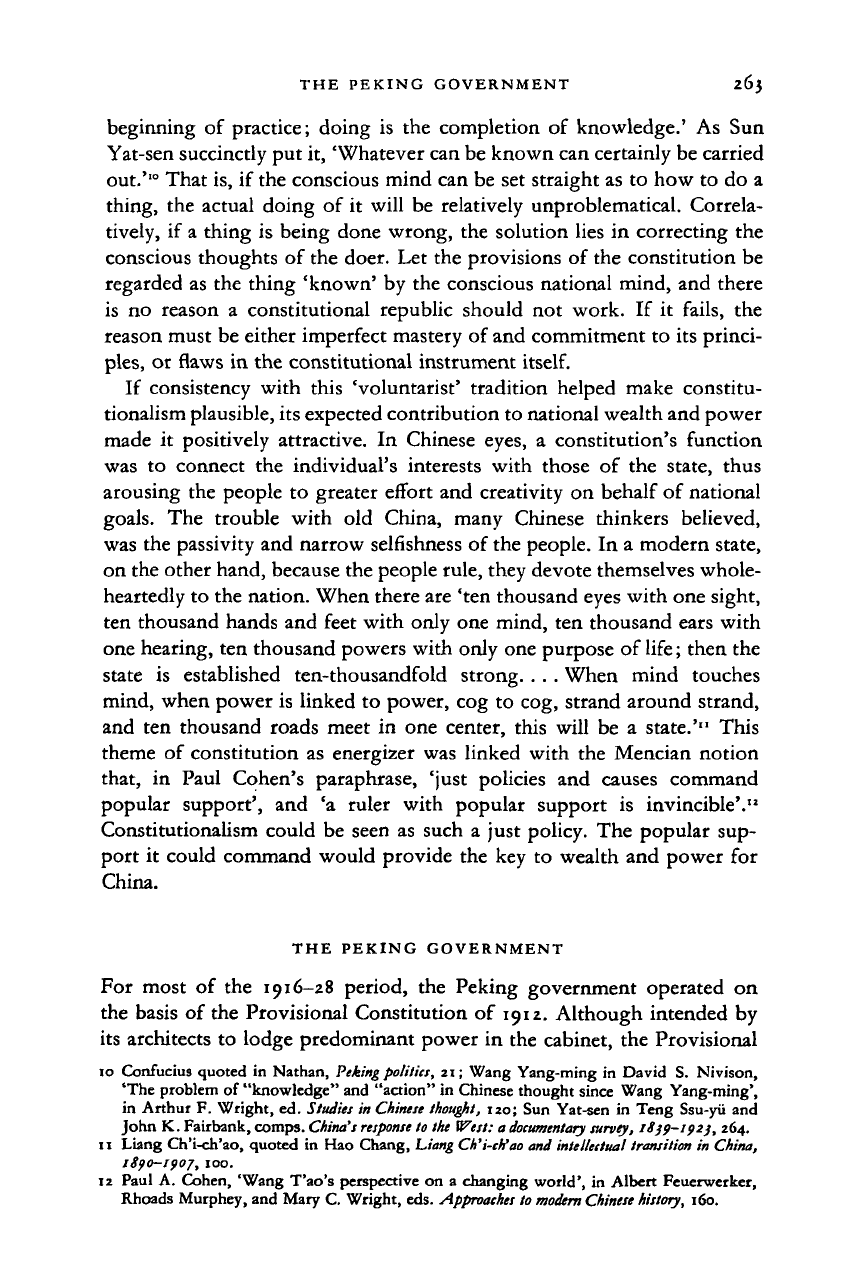
THE PEKING GOVERNMENT 263
beginning of practice; doing is the completion of knowledge.' As Sun
Yat-sen succinctly put it, 'Whatever can be known can certainly be carried
out.'
10
That is, if the conscious mind can be set straight as to how to do a
thing, the actual doing of it will be relatively unproblematical. Correla-
tively, if a thing is being done wrong, the solution lies in correcting the
conscious thoughts of the doer. Let the provisions of the constitution be
regarded as the thing 'known' by the conscious national mind, and there
is no reason a constitutional republic should not work. If it fails, the
reason must be either imperfect mastery of and commitment to its princi-
ples,
or flaws in the constitutional instrument
itself.
If consistency with this 'voluntarist' tradition helped make constitu-
tionalism plausible, its expected contribution to national wealth and power
made it positively attractive. In Chinese eyes, a constitution's function
was to connect the individual's interests with those of the state, thus
arousing the people to greater effort and creativity on behalf of national
goals.
The trouble with old China, many Chinese thinkers believed,
was the passivity and narrow selfishness of the people. In a modern state,
on the other hand, because the people rule, they devote themselves whole-
heartedly to the nation. When there are 'ten thousand eyes with one sight,
ten thousand hands and feet with only one mind, ten thousand ears with
one hearing, ten thousand powers with only one purpose of life; then the
state is established ten-thousandfold strong. . . . When mind touches
mind, when power is linked to power, cog to cog, strand around strand,
and ten thousand roads meet in one center, this will be a state.'" This
theme of constitution as energizer was linked with the Mencian notion
that, in Paul Cohen's paraphrase, 'just policies and causes command
popular support', and 'a ruler with popular support is invincible'."
Constitutionalism could be seen as such a just policy. The popular sup-
port it could command would provide the key to wealth and power for
China.
THE PEKING GOVERNMENT
For most of the 1916-28 period, the Peking government operated on
the basis of the Provisional Constitution of 1912. Although intended by
its architects to lodge predominant power in the cabinet, the Provisional
10 Confucius quoted in Nathan,
Peking
polities, 21; Wang Yang-ming in David S. Nivison,
'The problem of "knowledge" and "action" in Chinese thought since Wang Yang-ming',
in Arthur F. Wright, ed. Studies in
Chinese
thought,
120; Sun Yat-sen in Teng Ssu-yii and
John K. Fairbank, comps.
China's response
to the West: a
documentary
survey,
1839-192}, 264.
11 Liang Ch'i-ch'ao, quoted in Hao Chang, Liang
Ch'i-cHao
and
intellectual transition
in China,
1890-1907, 100.
12 Paul A. Cohen, 'Wang T'ao's perspective on a changing world', in Albert Feuerwerker,
Rhoads Murphey, and Mary C. Wright, eds. Approaches to
modern Chinese
history,
160.
Cambridge Histories Online © Cambridge University Press, 2008
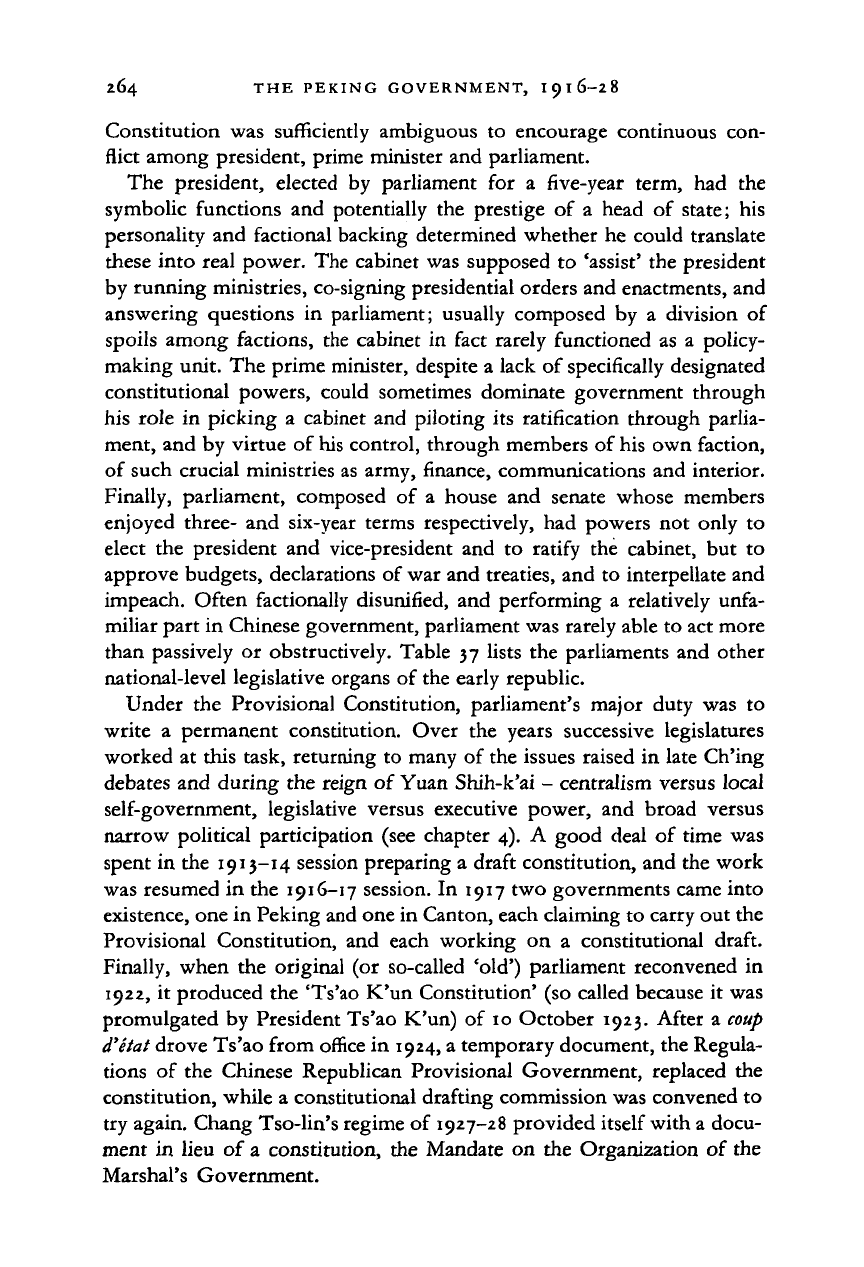
THE PEKING GOVERNMENT, I 9 I 6-2 8
Constitution was sufficiently ambiguous
to
encourage continuous con-
flict among president, prime minister and parliament.
The president, elected
by
parliament
for a
five-year term,
had the
symbolic functions and potentially the prestige
of a
head
of
state;
his
personality and factional backing determined whether he could translate
these into real power. The cabinet was supposed to 'assist' the president
by running ministries, co-signing presidential orders and enactments, and
answering questions
in
parliament; usually composed
by a
division
of
spoils among factions, the cabinet
in
fact rarely functioned as
a
policy-
making unit. The prime minister, despite
a
lack of specifically designated
constitutional powers, could sometimes dominate government through
his role
in
picking
a
cabinet and piloting its ratification through parlia-
ment, and by virtue of his control, through members of his own faction,
of such crucial ministries as army, finance, communications and interior.
Finally, parliament, composed
of a
house
and
senate whose members
enjoyed three- and six-year terms respectively, had powers not only
to
elect the president and vice-president and
to
ratify
the
cabinet,
but to
approve budgets, declarations of war and treaties, and to interpellate and
impeach. Often factionally disunified, and performing
a
relatively unfa-
miliar part in Chinese government, parliament was rarely able to act more
than passively
or
obstructively. Table 37 lists the parliaments and other
national-level legislative organs of the early republic.
Under the Provisional Constitution, parliament's major duty was
to
write
a
permanent constitution. Over
the
years successive legislatures
worked at this task, returning to many of the issues raised in late Ch'ing
debates and during the reign of Yuan Shih-k'ai
-
centralism versus local
self-government, legislative versus executive power,
and
broad versus
narrow political participation (see chapter 4).
A
good deal
of
time was
spent in the 1913-14 session preparing
a
draft constitution, and the work
was resumed in the 1916-17 session. In 1917 two governments came into
existence, one in Peking and one in Canton, each claiming to carry out the
Provisional Constitution, and each working
on a
constitutional draft.
Finally, when the original (or so-called 'old') parliament reconvened
in
1922,
it produced the 'Ts'ao K'un Constitution' (so called because
it
was
promulgated by President Ts'ao K'un)
of
10 October 1923. After
a
coup
d'etat drove Ts'ao from office in 1924, a temporary document, the Regula-
tions
of
the Chinese Republican Provisional Government, replaced
the
constitution, while
a
constitutional drafting commission was convened to
try again. Chang Tso-lin's regime
of
1927-28 provided itself with a docu-
ment
in
lieu
of a
constitution, the Mandate
on
the Organization
of
the
Marshal's Government.
Cambridge Histories Online © Cambridge University Press, 2008
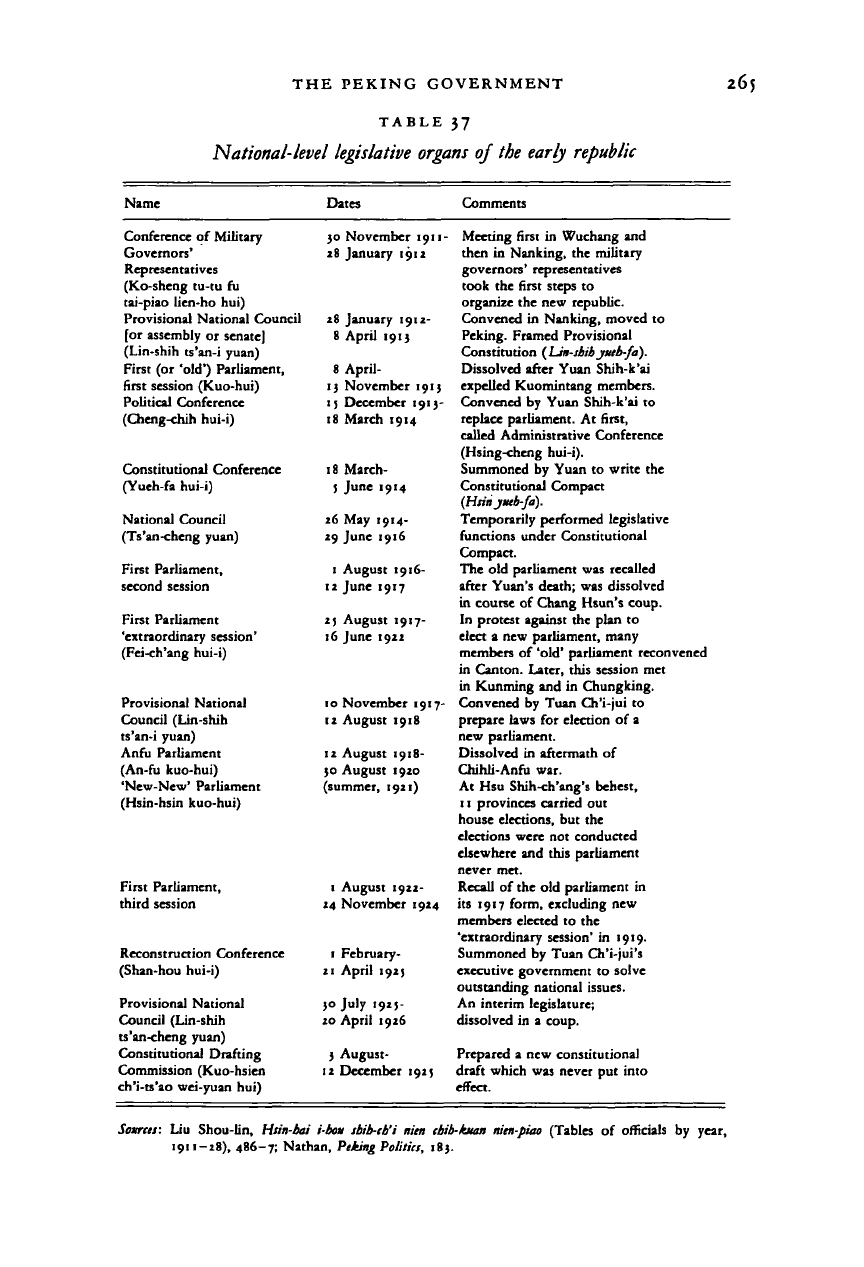
THE PEKING GOVERNMENT
265
TABLE 37
National-level
legislative organs
of the early republic
Name Dates
Comments
Conference of Military
Governors*
Representatives
(Ko-sheng tu-tu fu
tai-piao lien-ho hui)
Provisional National Council
[or assembly or senate]
(Lin-shih ts'an-i yuan)
First (or 'old') Parliament,
first session (Kuo-hui)
Political Conference
(Cheng-chih hui-i)
Constitutional Conference
(Yueh-fa hui-i)
National Council
(Ts'an-cheng yuan)
First Parliament,
second session
First Parliament
'extraordinary session'
(Fei-ch'ang hui-i)
Provisional National
Council (Lin-shih
ts'an-i yuan)
Anfu Parliament
(An-fu kuo-hui)
'New-New' Parliament
(Hsin-hsin kuo-hui)
First Parliament,
third session
Reconstruction Conference
(Shan-hou hui-i)
Provisional National
Council (Lin-shih
ts'an-cheng yuan)
Constitutional Drafting
Commission (Kuo-hsien
ch'i-ts'ao wei-yuan hui)
30 November 1911- Meeting first in Wuchang and
28 January 1912 then in Nanking, the military
governors' representatives
took the first steps to
organize the new republic.
28 January 1912- Convened in Nanking, moved to
8 April 1913 Peking. Framed Provisional
Constitution (Ua-sbib
jueb-fa).
8 April- Dissolved after Yuan Shih-k'ai
13 November 1913 expelled Kuomintang members.
1;
December 1913- Convened by Yuan Shih-k'ai to
18 March 1914 replace parliament. At first,
called Administrative Conference
(Hsing-cheng hui-i).
18 March- Summoned by Yuan to write the
t June 1914 Constitutional Compact
(Hsiri
jneb-fa).
26 May 1914- Temporarily performed legislative
29 June 1916 functions under Constitutional
Compact.
1 August 1916- The old parliament was recalled
12 June 1917 after Yuan's death; was dissolved
in course of Chang Hsun's coup.
2;
August 1917- In protest against the plan to
16 June 1922 elect a new parliament, many
members of 'old* parliament reconvened
in Canton. Later, this session met
in Kunming and in Chungking.
10 November 1917- Convened by Tuan Ch'i-jui to
12 August 1918 prepare laws for election of a
new parliament.
12 August 1918- Dissolved in aftermath of
30 August 1920 Chihli-Anfu war.
(summer, 1921) At Hsu Shih-ch'ang's behest,
11 provinces carried out
house elections, but the
elections were not conducted
elsewhere and this parliament
never met.
1 August 1922- Recall of the old parliament in
24 November 1924 its 1917 form, excluding new
members elected to the
'extraordinary session' in 1919.
1 February- Summoned by Tuan Ch'i-jui's
21 April 192} executive government to solve
outstanding national issues.
30 July 192)- An interim legislature;
20 April 1926 dissolved in a coup.
3 August- Prepared a new constitutional
12 December 192) draft which was never put into
effect.
Sources:
Liu Shou-lin, Hsin-bai i-bou sbib-tb'i nien
chih-kuan nien-piao
(Tables of officials by year,
1911-28), 486-7; Nathan, Peking Politics, 185.
Cambridge Histories Online © Cambridge University Press, 2008
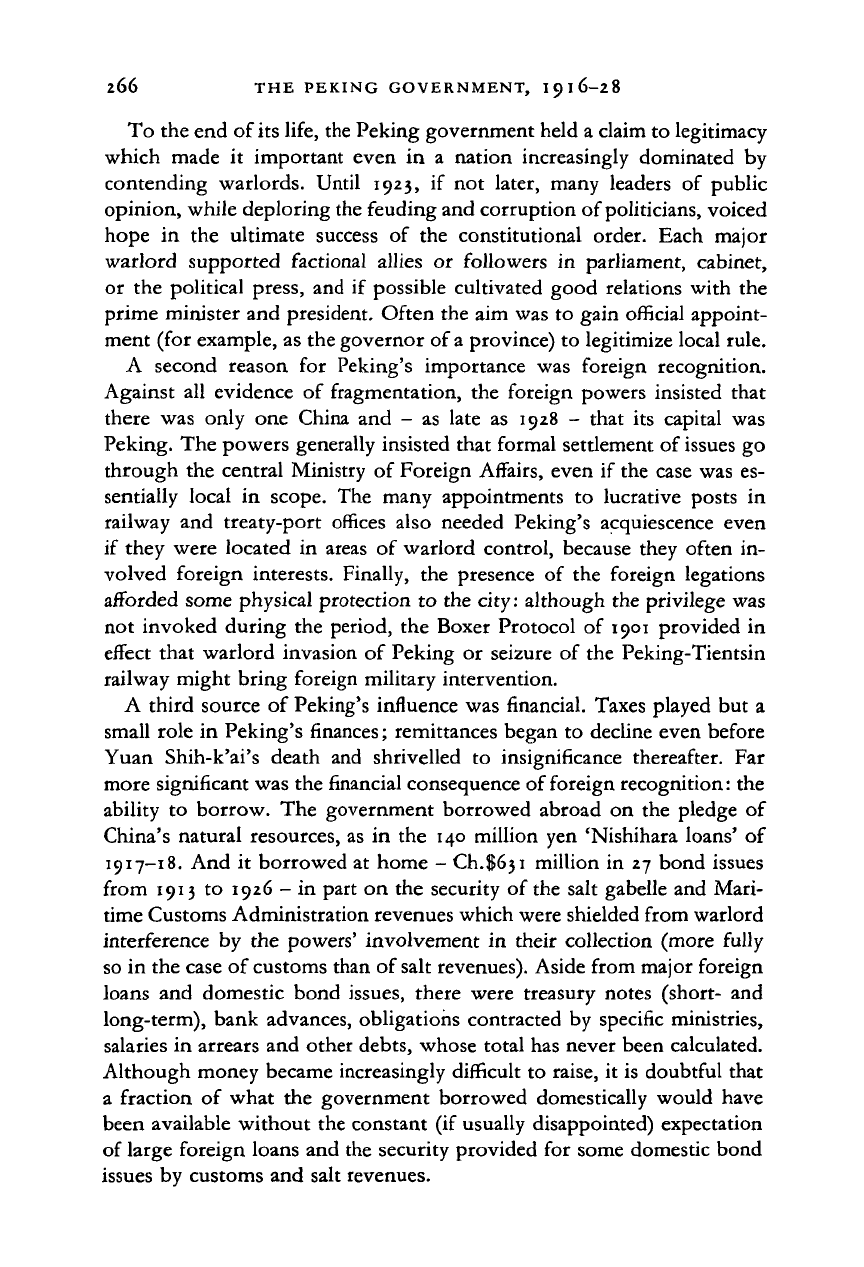
266 THE PEKING GOVERNMENT, 1916-28
To the end of
its
life, the Peking government held a claim to legitimacy
which made
it
important even
in a
nation increasingly dominated
by
contending warlords. Until 1923,
if
not later, many leaders
of
public
opinion, while deploring the feuding and corruption of politicians, voiced
hope
in the
ultimate success
of the
constitutional order. Each major
warlord supported factional allies
or
followers
in
parliament, cabinet,
or the political press, and
if
possible cultivated good relations with the
prime minister and president. Often the aim was to gain official appoint-
ment (for example, as the governor of
a
province) to legitimize local rule.
A second reason
for
Peking's importance was foreign recognition.
Against
all
evidence
of
fragmentation, the foreign powers insisted that
there was only one China and
- as
late
as
1928
-
that
its
capital was
Peking. The powers generally insisted that formal settlement of issues go
through the central Ministry
of
Foreign Affairs, even
if
the case was es-
sentially local
in
scope. The many appointments
to
lucrative posts
in
railway and treaty-port offices also needed Peking's acquiescence even
if they were located
in
areas
of
warlord control, because they often in-
volved foreign interests. Finally,
the
presence
of
the foreign legations
afforded some physical protection to the city: although the privilege was
not invoked during the period, the Boxer Protocol
of
1901 provided
in
effect that warlord invasion
of
Peking
or
seizure
of
the Peking-Tientsin
railway might bring foreign military intervention.
A third source
of
Peking's influence was financial. Taxes played but
a
small role
in
Peking's finances; remittances began to decline even before
Yuan Shih-k'ai's death
and
shrivelled
to
insignificance thereafter.
Far
more significant was the financial consequence of foreign recognition: the
ability
to
borrow. The government borrowed abroad
on
the pledge
of
China's natural resources, as
in
the 140 million yen 'Nishihara loans'
of
1917-18.
And
it
borrowed at home
-
Ch.$63i million in 27 bond issues
from I9i3toi926-in part on the security
of
the salt gabelle and Mari-
time Customs Administration revenues which were shielded from warlord
interference
by
the powers' involvement
in
their collection (more fully
so in the case of customs than of salt revenues). Aside from major foreign
loans and domestic bond issues, there were treasury notes (short- and
long-term), bank advances, obligations contracted
by
specific ministries,
salaries in arrears and other debts, •whose total has never been calculated.
Although money became increasingly difficult to raise,
it
is doubtful that
a fraction
of
what the government borrowed domestically would have
been available without the constant
(if
usually disappointed) expectation
of large foreign loans and the security provided for some domestic bond
issues by customs and salt revenues.
Cambridge Histories Online © Cambridge University Press, 2008
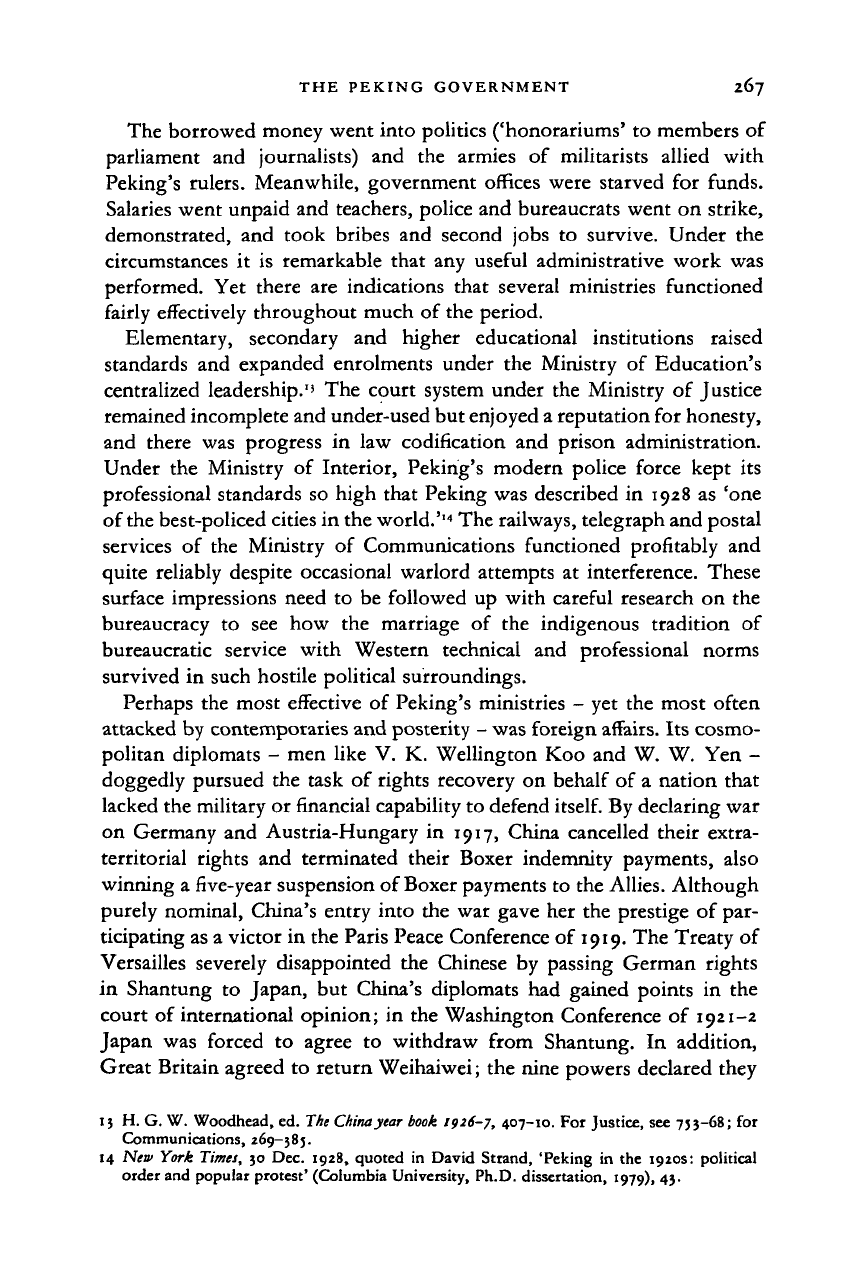
THE PEKING GOVERNMENT 267
The borrowed money went into politics ('honorariums' to members of
parliament and journalists) and the armies of militarists allied with
Peking's rulers. Meanwhile, government offices were starved for funds.
Salaries went unpaid and teachers, police and bureaucrats went on strike,
demonstrated, and took bribes and second jobs to survive. Under the
circumstances it is remarkable that any useful administrative work was
performed. Yet there are indications that several ministries functioned
fairly effectively throughout much of the period.
Elementary, secondary and higher educational institutions raised
standards and expanded enrolments under the Ministry of Education's
centralized leadership.
1
' The court system under the Ministry of Justice
remained incomplete and under-used but enjoyed a reputation for honesty,
and there was progress in law codification and prison administration.
Under the Ministry of Interior, Peking's modern police force kept its
professional standards so high that Peking was described in 1928 as 'one
of
the
best-policed cities in the world.'
14
The railways, telegraph and postal
services of the Ministry of Communications functioned profitably and
quite reliably despite occasional warlord attempts at interference. These
surface impressions need to be followed up with careful research on the
bureaucracy to see how the marriage of the indigenous tradition of
bureaucratic service with Western technical and professional norms
survived in such hostile political surroundings.
Perhaps the most effective of Peking's ministries - yet the most often
attacked by contemporaries and posterity - was foreign affairs. Its cosmo-
politan diplomats - men like V. K. Wellington Koo and W. W. Yen -
doggedly pursued the task of rights recovery on behalf of a nation that
lacked the military or financial capability to defend
itself.
By declaring war
on Germany and Austria-Hungary in 1917, China cancelled their extra-
territorial rights and terminated their Boxer indemnity payments, also
winning a five-year suspension of Boxer payments to the Allies. Although
purely nominal, China's entry into the war gave her the prestige of par-
ticipating as a victor in the Paris Peace Conference of 1919. The Treaty of
Versailles severely disappointed the Chinese by passing German rights
in Shantung to Japan, but China's diplomats had gained points in the
court of international opinion; in the Washington Conference of 1921-2
Japan was forced to agree to withdraw from Shantung. In addition,
Great Britain agreed to return Weihaiwei; the nine powers declared they
13 H. G. W. Woodhead, ed. The China year
book
1926-7, 407-10. For Justice, see 753-68; for
Communications, 269-385.
14 New York Times, 30 Dec. 1928, quoted in David Strand, 'Peking in the 1920s: political
order and popular protest' (Columbia University, Ph.D. dissertation, 1979), 43-
Cambridge Histories Online © Cambridge University Press, 2008
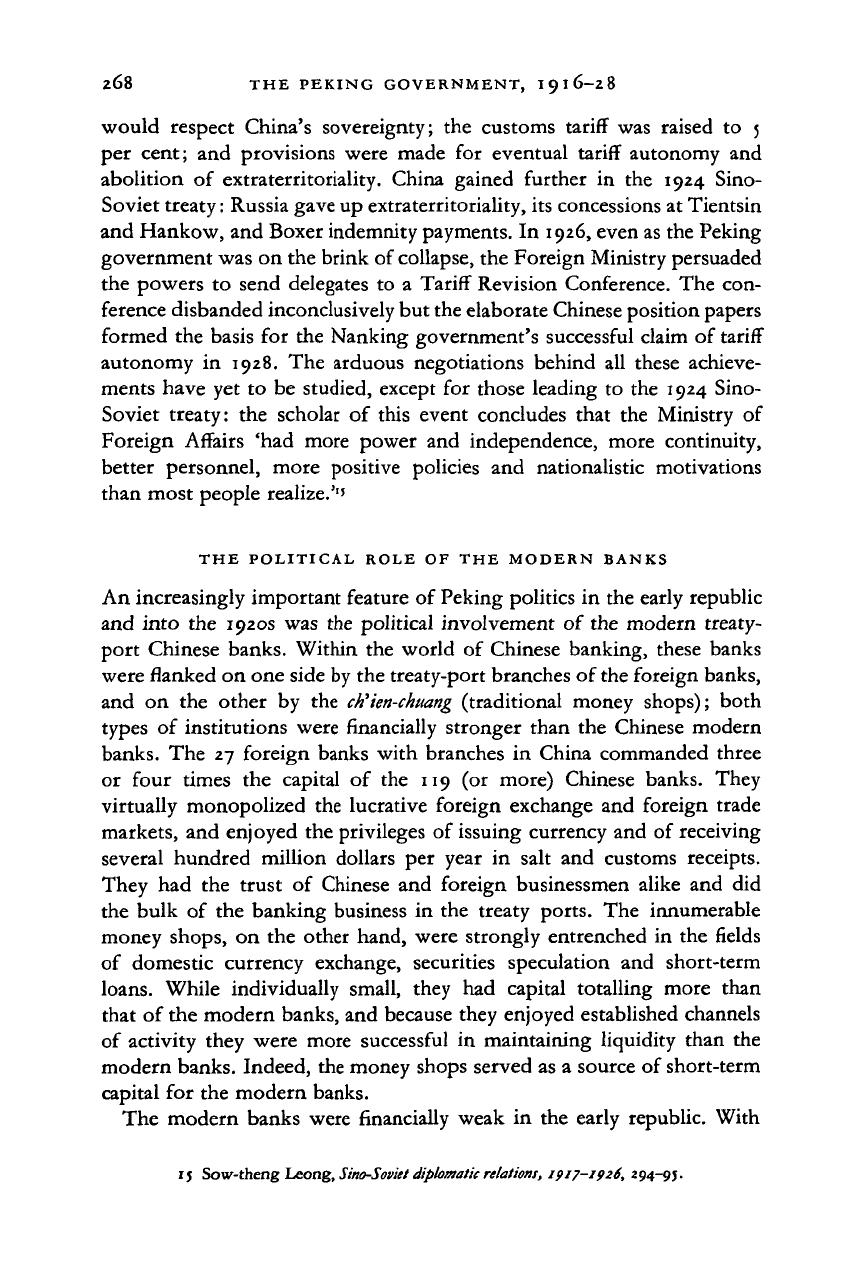
268 THE PEKING GOVERNMENT, I 9 I 6-2 8
would respect China's sovereignty;
the
customs tariff
was
raised
to 5
per cent;
and
provisions were made
for
eventual tariff autonomy
and
abolition
of
extraterritoriality. China gained further
in the 1924
Sino-
Soviet treaty: Russia gave up extraterritoriality, its concessions
at
Tientsin
and Hankow, and Boxer indemnity payments.
In
1926, even as the Peking
government was
on
the brink
of
collapse, the Foreign Ministry persuaded
the powers
to
send delegates
to a
Tariff Revision Conference.
The con-
ference disbanded inconclusively but the elaborate Chinese position papers
formed
the
basis
for the
Nanking government's successful claim
of
tariff
autonomy
in
1928.
The
arduous negotiations behind
all
these achieve-
ments have
yet to be
studied, except
for
those leading
to the
1924 Sino-
Soviet treaty:
the
scholar
of
this event concludes that
the
Ministry
of
Foreign Affairs
'had
more power
and
independence, more continuity,
better personnel, more positive policies
and
nationalistic motivations
than most people realize.'
1
'
THE POLITICAL ROLE OF THE MODERN BANKS
An increasingly important feature
of
Peking politics
in
the early republic
and into
the
1920s
was the
political involvement
of
the modern treaty-
port Chinese banks. Within
the
world
of
Chinese banking, these banks
were flanked
on
one side by the treaty-port branches
of
the foreign banks,
and
on the
other
by the
ch'ien-chuang
(traditional money shops); both
types
of
institutions were financially stronger than
the
Chinese modern
banks.
The 27
foreign banks with branches
in
China commanded three
or four times
the
capital
of the 119 (or
more) Chinese banks. They
virtually monopolized
the
lucrative foreign exchange
and
foreign trade
markets,
and
enjoyed the privileges
of
issuing currency
and of
receiving
several hundred million dollars
per
year
in
salt
and
customs receipts.
They
had the
trust
of
Chinese
and
foreign businessmen alike
and did
the bulk
of the
banking business
in the
treaty ports.
The
innumerable
money shops,
on the
other hand, were strongly entrenched
in the
fields
of domestic currency exchange, securities speculation
and
short-term
loans.
While individually small, they
had
capital totalling more than
that
of
the modern banks, and because they enjoyed established channels
of activity they were more successful
in
maintaining liquidity than
the
modern banks. Indeed, the money shops served
as a
source
of
short-term
capital
for the
modern banks.
The modern banks were financially weak
in the
early republic. With
15 Sow-theng Leong,
Sino-Soviet diplomatic
relations,
1917-1926, 294-95.
Cambridge Histories Online © Cambridge University Press, 2008
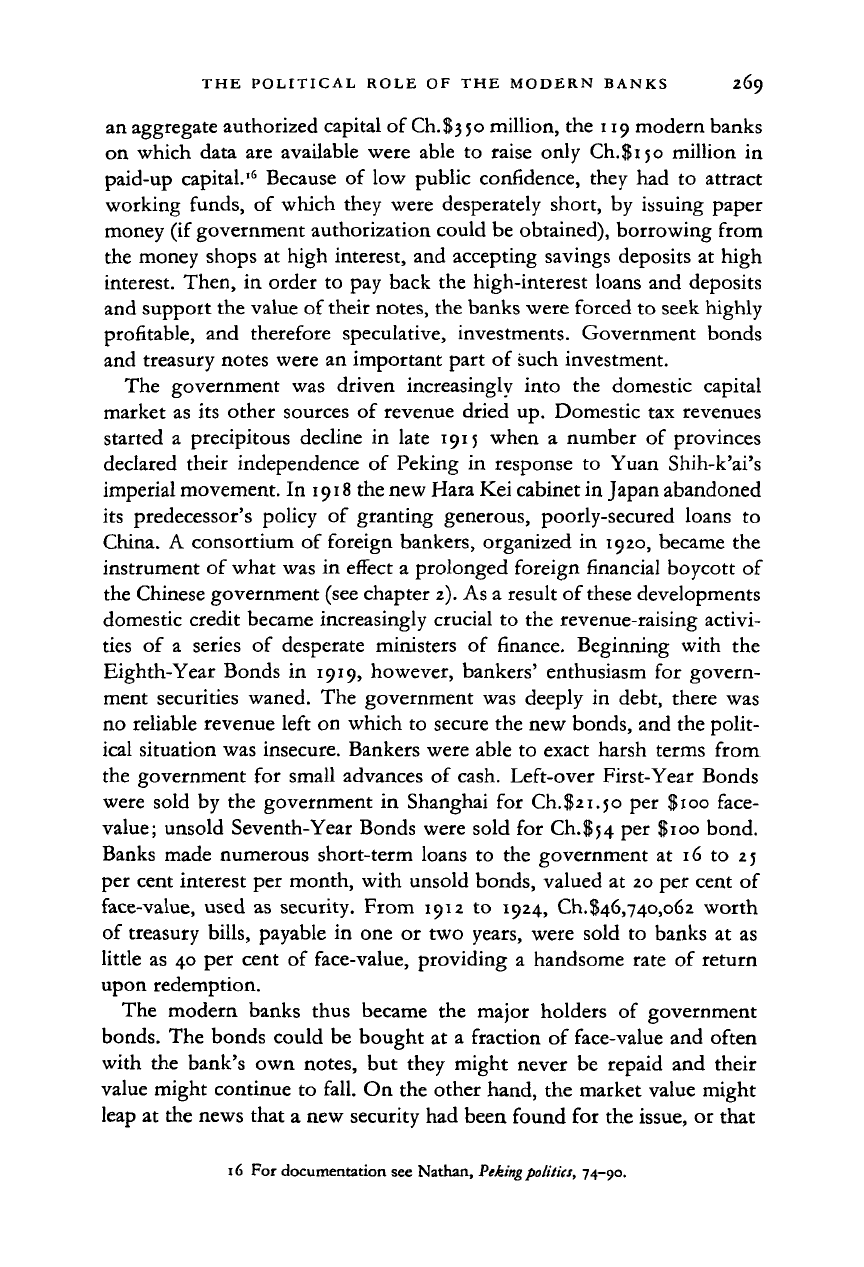
THE POLITICAL ROLE OF THE MODERN BANKS 269
an aggregate authorized capital of
Ch.$3 50
million, the 119 modern banks
on which data are available were able to raise only Ch.$i5o million in
paid-up capital.
16
Because of low public confidence, they had to attract
working funds, of which they were desperately short, by issuing paper
money (if government authorization could be obtained), borrowing from
the money shops at high interest, and accepting savings deposits at high
interest. Then, in order to pay back the high-interest loans and deposits
and support the value of their notes, the banks were forced to seek highly
profitable, and therefore speculative, investments. Government bonds
and treasury notes were an important part of such investment.
The government was driven increasingly into the domestic capital
market as its other sources of revenue dried up. Domestic tax revenues
started a precipitous decline in late 1915 when a number of provinces
declared their independence of Peking in response to Yuan Shih-k'ai's
imperial movement. In 1918 the new Hara Kei cabinet in Japan abandoned
its predecessor's policy of granting generous, poorly-secured loans to
China. A consortium of foreign bankers, organized in 1920, became the
instrument of what was in effect a prolonged foreign financial boycott of
the Chinese government (see chapter 2). As a result of these developments
domestic credit became increasingly crucial to the revenue-raising activi-
ties of a series of desperate ministers of finance. Beginning with the
Eighth-Year Bonds in 1919, however, bankers' enthusiasm for govern-
ment securities waned. The government was deeply in debt, there was
no reliable revenue left on which to secure the new bonds, and the polit-
ical situation was insecure. Bankers were able to exact harsh terms from
the government for small advances of cash. Left-over First-Year Bonds
were sold by the government in Shanghai for Ch.S21.50 per $100 face-
value; unsold Seventh-Year Bonds were sold for Ch.$54 per 8100 bond.
Banks made numerous short-term loans to the government at 16 to 25
per cent interest per month, with unsold bonds, valued at 20 per cent of
face-value, used as security. From 1912 to 1924, 01.546,740,062 worth
of treasury bills, payable in one or two years, were sold to banks at as
little as 40 per cent of face-value, providing a handsome rate of return
upon redemption.
The modern banks thus became the major holders of government
bonds. The bonds could be bought at a fraction of face-value and often
with the bank's own notes, but they might never be repaid and their
value might continue to fall. On the other hand, the market value might
leap at the news that a new security had been found for the issue, or that
16 For documentation see Nathan, Peking
politics,
74-90.
Cambridge Histories Online © Cambridge University Press, 2008
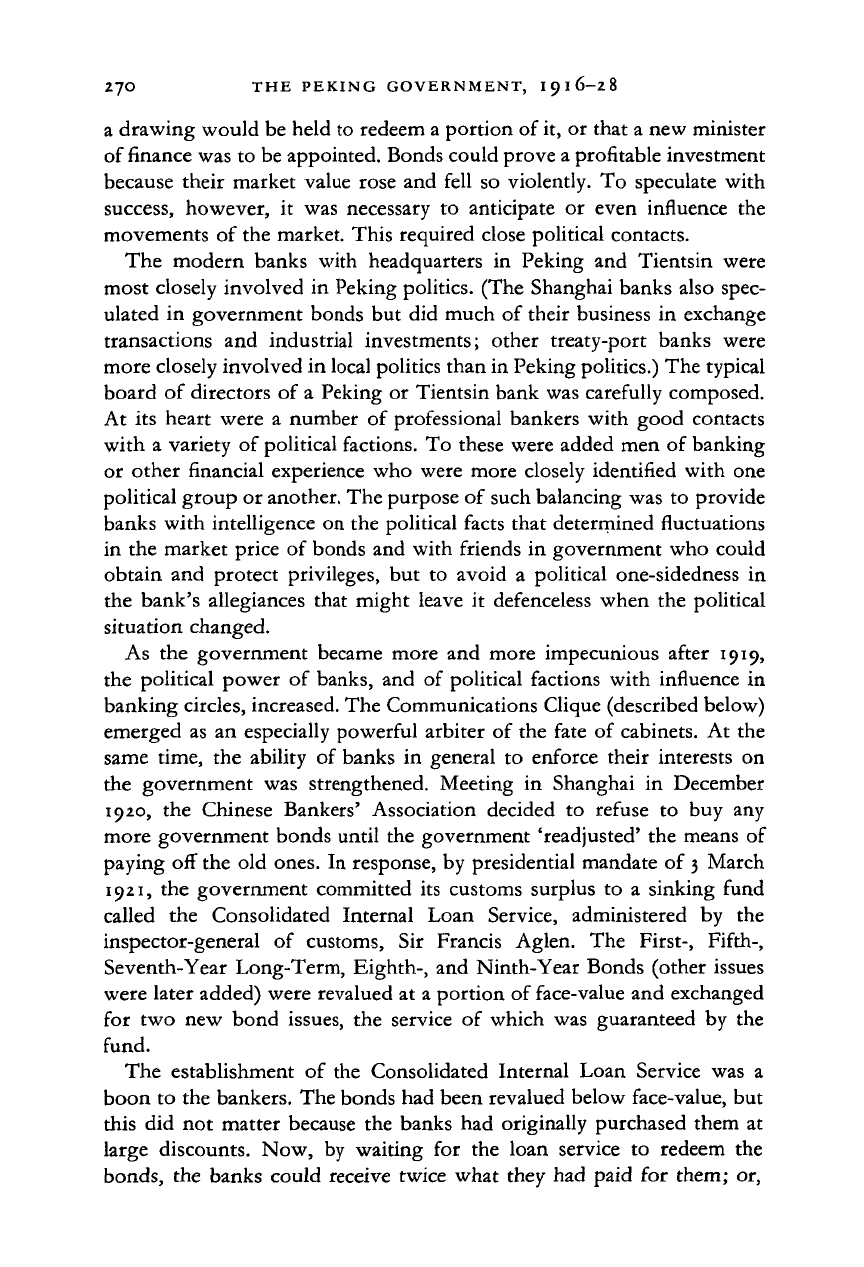
270 THE PEKING GOVERNMENT, I 9 I 6-2 8
a drawing would be held to redeem a portion of it, or that a new minister
of finance was to be appointed. Bonds could prove a profitable investment
because their market value rose and fell so violently.
To
speculate with
success, however,
it
was necessary
to
anticipate
or
even influence
the
movements
of
the market. This required close political contacts.
The modern banks with headquarters
in
Peking
and
Tientsin were
most closely involved in Peking politics. (The Shanghai banks also spec-
ulated
in
government bonds but did much
of
their business
in
exchange
transactions
and
industrial investments; other treaty-port banks were
more closely involved in local politics than in Peking politics.) The typical
board
of
directors
of
a Peking or Tientsin bank was carefully composed.
At its heart were
a
number
of
professional bankers with good contacts
with
a
variety of political factions. To these were added men of banking
or other financial experience who were more closely identified with one
political group or another. The purpose
of
such balancing was to provide
banks with intelligence on the political facts that determined fluctuations
in the market price of bonds and with friends in government who could
obtain and protect privileges,
but to
avoid
a
political one-sidedness
in
the bank's allegiances that might leave
it
defenceless when the political
situation changed.
As the government became more and more impecunious after 1919,
the political power
of
banks, and
of
political factions with influence
in
banking circles, increased. The Communications Clique (described below)
emerged as an especially powerful arbiter
of
the fate
of
cabinets.
At
the
same time, the ability
of
banks
in
general
to
enforce their interests
on
the government was strengthened. Meeting
in
Shanghai
in
December
1920,
the
Chinese Bankers' Association decided
to
refuse
to
buy any
more government bonds until the government 'readjusted' the means of
paying off the old ones. In response, by presidential mandate
of
3
March
1921,
the government committed
its
customs surplus
to a
sinking fund
called
the
Consolidated Internal Loan Service, administered
by the
inspector-general
of
customs,
Sir
Francis Aglen.
The
First-, Fifth-,
Seventh-Year Long-Term, Eighth-, and Ninth-Year Bonds (other issues
were later added) were revalued at a portion of face-value and exchanged
for two new bond issues,
the
service
of
which was guaranteed
by the
fund.
The establishment
of
the Consolidated Internal Loan Service was
a
boon to the bankers. The bonds had been revalued below face-value, but
this did not matter because the banks had originally purchased them
at
large discounts. Now,
by
waiting
for the
loan service
to
redeem
the
bonds, the banks could receive twice what they had paid
for
them;
or,
Cambridge Histories Online © Cambridge University Press, 2008
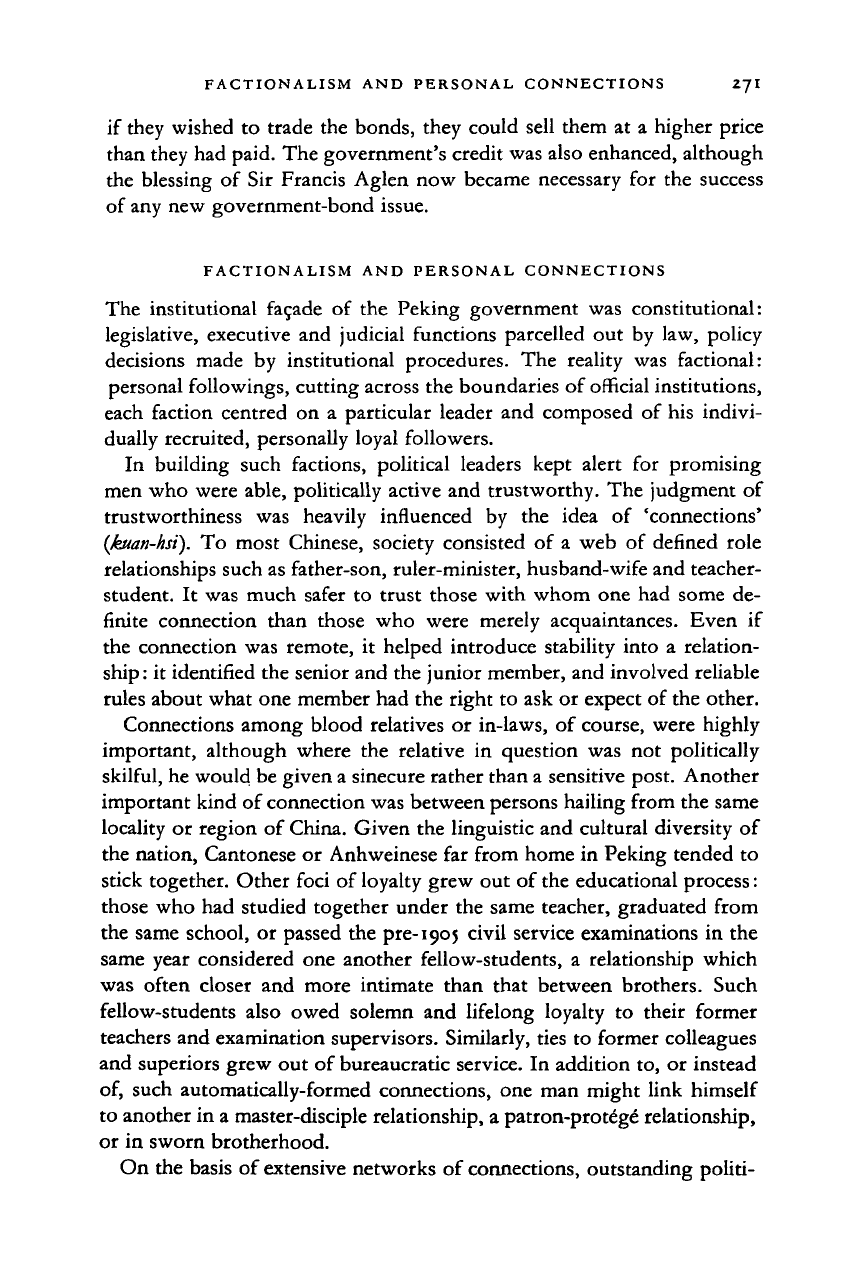
FACTIONALISM AND PERSONAL CONNECTIONS 27I
if they wished
to
trade the bonds, they could sell them
at a
higher price
than they had paid. The government's credit was also enhanced, although
the blessing
of
Sir Francis Aglen now became necessary
for
the success
of any new government-bond issue.
FACTIONALISM AND PERSONAL CONNECTIONS
The institutional facade
of
the Peking government was constitutional:
legislative, executive and judicial functions parcelled out
by
law, policy
decisions made
by
institutional procedures.
The
reality was factional:
personal followings, cutting across the boundaries of official institutions,
each faction centred
on a
particular leader and composed
of
his indivi-
dually recruited, personally loyal followers.
In building such factions, political leaders kept alert
for
promising
men who were able, politically active and trustworthy. The judgment of
trustworthiness
was
heavily influenced
by the
idea
of
'connections'
(Jkuan-hsi).
To
most Chinese, society consisted
of a
web
of
defined role
relationships such as father-son, ruler-minister, husband-wife and teacher-
student.
It
was much safer
to
trust those with whom one had some de-
finite connection than those who were merely acquaintances. Even
if
the connection was remote,
it
helped introduce stability into
a
relation-
ship:
it
identified the senior and the junior member, and involved reliable
rules about what one member had the right to ask or expect of the other.
Connections among blood relatives
or
in-laws,
of
course, were highly
important, although where
the
relative
in
question was
not
politically
skilful, he would be given a sinecure rather than a sensitive post. Another
important kind of connection was between persons hailing from the same
locality
or
region
of
China. Given the linguistic and cultural diversity of
the nation, Cantonese
or
Anhweinese far from home in Peking tended
to
stick together. Other foci of loyalty grew out of the educational process:
those who had studied together under the same teacher, graduated from
the same school,
or
passed the pre-1905 civil service examinations
in
the
same year considered one another fellow-students,
a
relationship which
was often closer
and
more intimate than that between brothers. Such
fellow-students also owed solemn
and
lifelong loyalty
to
their former
teachers and examination supervisors. Similarly, ties to former colleagues
and superiors grew out of bureaucratic service. In addition to, or instead
of, such automatically-formed connections, one man might link himself
to another in a master-disciple relationship, a patron-protege relationship,
or in sworn brotherhood.
On the basis of extensive networks of connections, outstanding politi-
Cambridge Histories Online © Cambridge University Press, 2008
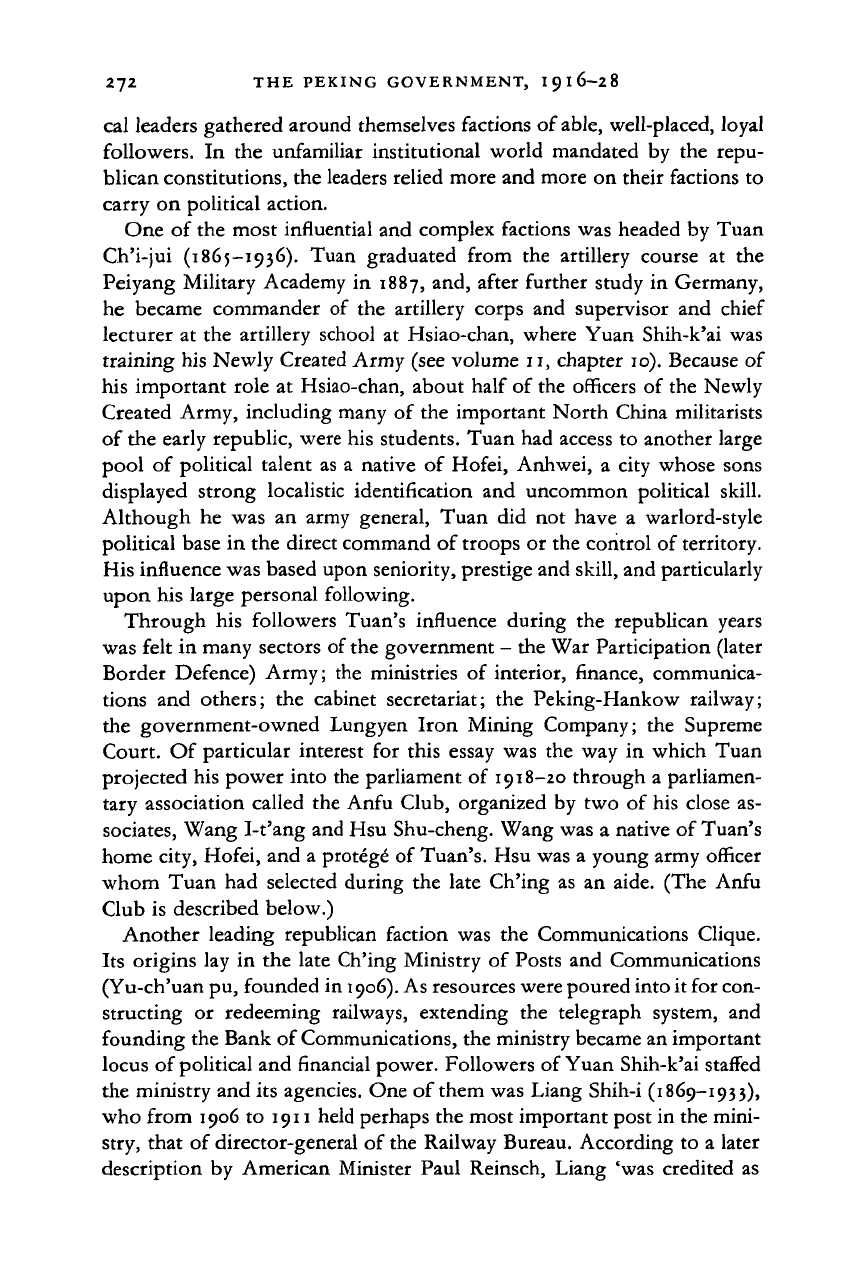
272 THE PEKING GOVERNMENT, I 9 I 6-2 8
cal leaders gathered around themselves factions of
able,
well-placed, loyal
followers. In the unfamiliar institutional world mandated by the repu-
blican constitutions, the leaders relied more and more on their factions to
carry on political action.
One of the most influential and complex factions was headed by Tuan
Ch'i-jui (1865-1936). Tuan graduated from the artillery course at the
Peiyang Military Academy in 1887, and, after further study in Germany,
he became commander of the artillery corps and supervisor and chief
lecturer at the artillery school at Hsiao-chan, where Yuan Shih-k'ai was
training his Newly Created Army (see volume
11,
chapter 10). Because of
his important role at Hsiao-chan, about half of the officers of the Newly
Created Army, including many of the important North China militarists
of the early republic, were his students. Tuan had access to another large
pool of political talent as a native of Hofei, Anhwei, a city whose sons
displayed strong localistic identification and uncommon political skill.
Although he was an army general, Tuan did not have a warlord-style
political base in the direct command of troops or the control of territory.
His influence was based upon seniority, prestige and skill, and particularly
upon his large personal following.
Through his followers Tuan's influence during the republican years
was felt in many sectors of the government - the War Participation (later
Border Defence) Army; the ministries of interior, finance, communica-
tions and others; the cabinet secretariat; the Peking-Hankow railway;
the government-owned Lungyen Iron Mining Company; the Supreme
Court. Of particular interest for this essay was the way in which Tuan
projected his power into the parliament of 1918-20 through a parliamen-
tary association called the Anfu Club, organized by two of his close as-
sociates, Wang I-t'ang and Hsu Shu-cheng. Wang was a native of Tuan's
home city, Hofei, and a protege of Tuan's. Hsu was a young army officer
whom Tuan had selected during the late Ch'ing as an aide. (The Anfu
Club is described below.)
Another leading republican faction was the Communications Clique.
Its origins lay in the late Ch'ing Ministry of Posts and Communications
(Yu-ch'uan pu, founded in
1906).
As resources were poured into it for con-
structing or redeeming railways, extending the telegraph system, and
founding the Bank of Communications, the ministry became an important
locus of political and financial power. Followers of Yuan Shih-k'ai staffed
the ministry and its agencies. One of them was Liang Shih-i (1869-1933),
who from 1906 to 1911 held perhaps the most important post in the mini-
stry, that of director-general of the Railway Bureau. According to a later
description by American Minister Paul Reinsch, Liang 'was credited as
Cambridge Histories Online © Cambridge University Press, 2008
